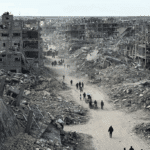Brussels, 14 September 2011 – During a work visit to the Bar of Brussels (*), the Burundian lawyer Caritas Niyonzima (see picture below) talks about the challenges her country is facing in terms of justice for the population. Burundi is the third poorest country in the world on the Human Development Index. With a population of eight million, the country has only 170 lawyers. Even though the sector of justice has been rebuilt over the past decade, most Burundians are unable to enforce their rights.
Most vulnerable people do not have access to justice in Burundi. What are the main obstacles?
There are many: the excessively slow procedures, lack of competences of legam professionals (police officers, judges, registrars, lawyers), suspicion of corruption state agents. Benefiting from the services of a lawyer is practically impossible for the largest part of the population due to financial but also due to geographical reasons, as most lawyers are concentrated in the capital Bujumbura.
Who is directly affected by this situation? Women?
 The first ones to be disadvantaged by this situation are the most vulnerable : minors, detained persons without a lawyer, poor people, and of course women. Let me give you an example linked to law on succession. A wife loses her husband. She has nine children, only girls. According to some customary practises, the deceased’s family can chase this woman out of her house and away from her land. She cannot return to her maiden family either. In absence of any “social” assistance, the children could be forced to start begging. The only option for this woman would be to take her case to court. And that is where the problem arises. This person is unaware of the rights she is entitled to, nor which procedures to follow or which jurisdiction to go to. She does not have the means to pay for the services of a lawyer. Whilst a lawyer could be considered as luxury, is access to justice a basic need.
The first ones to be disadvantaged by this situation are the most vulnerable : minors, detained persons without a lawyer, poor people, and of course women. Let me give you an example linked to law on succession. A wife loses her husband. She has nine children, only girls. According to some customary practises, the deceased’s family can chase this woman out of her house and away from her land. She cannot return to her maiden family either. In absence of any “social” assistance, the children could be forced to start begging. The only option for this woman would be to take her case to court. And that is where the problem arises. This person is unaware of the rights she is entitled to, nor which procedures to follow or which jurisdiction to go to. She does not have the means to pay for the services of a lawyer. Whilst a lawyer could be considered as luxury, is access to justice a basic need.
What should be done to bring change about?
For this woman, like for many others, there should be a law on succession. Also, gender equality is enshrined in our Constitution, therefore this principle could be used as an legal argument, if known to the public. In general, the situation is complex. This is why each actor of the legal system should work together. I am convinced that the lack of human or financial resources can be partly solved by a common will to improve access to justice. This is why a Forum on legal aid, regrouping the bar, civil society organisations and the Ministry of Justice, was established to coordinate and improve judicial aid for the most vulnerable.
The Burundian authorities have recently put pressure on lawyers, in some cases even leading to imprisonments. What is your view on this?
Imprisoning a lawyer without a valid motive can be understood as a threat against our profession. Moreover, the decision of a Prosecutor to put persons who know the law is not a positive message for the population. Such a climate does not contribute to the establishment of a rule of law either. I am convinced that the general development of Burundi – or any other country – and the development of the rule of law go hand in hand. Justice is a basic need, like health care and education. What is needed, is that all stakeholders cooperate in mutual respect of everyone’s profession.
You are member of a Burundian delegation of legal professionals currently in Brussels on the initiative of ASF. What is the purpose of this study trip?
The legal tradition of Burundi is very similar to the Belgian one. We are here to learn the best practises of the Bar of Brussels, the Ministry of Justice and other organisations providing legal aid to the most vulnerable. In addition to this exchange of experiences, beingtogether during one week – representatives of the Burundian Ministry of Justice, NGOs and the Bar – is an expression of our joint will to make progress inBurundi. It also offers me the opportunity to discuss, in a constructive manner, the challenges the authorities of my country are facing and how to address those challenges.
(*) This study trip is part of the project to support the establishment of a national legal aid policy in Burundi. The visit was organised in collaboration with the Bar of Brussels (Order of the French speaking Lawyers) with the support of the UK Department for International Development (DFID).
ASF is operational in Burundi since 1999. For more information



